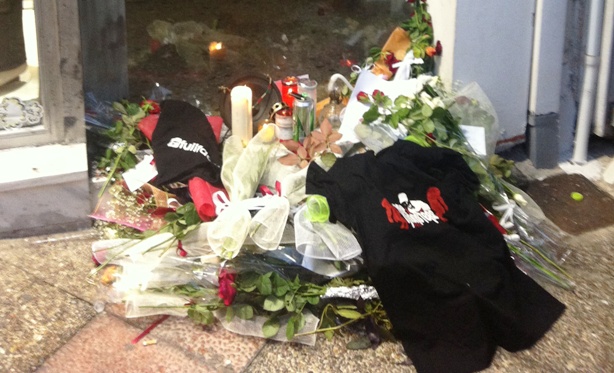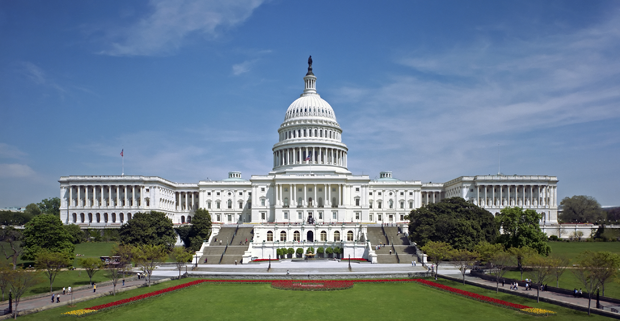19 Sep 2013 | Europe and Central Asia, Greece, News

Tributes to murdered activist Pavlos Fyssas (pic: Christos Syllas-Dellis)
Thousands of protesters gathered on Wednesday evening in Athens near the place where Pavlos Fyssas, a 34 year-old antifascist hip hop artist was murdered by a Golden Dawn supporter.
“The blood is running, it seeks revenge”, they shouted, a slogan echoing the December 2008 riots , when 15 year-old student Alexandros Grigoropoulos was killed by two policemen.
The 45 year-old man who carried out the stabbing has told police that he was a supporter of far-right party Golden Dawn. This was clearly a politically motivated killing, added to a sequence of intimidation events and attacks carried out by Golden Dawn against immigrants and asylum seekers.
On 17 January, Shehzad Luqman, an immigrant worker from Pakistan was lethally stabbed by two men. Police later found pre-election pamphlets of Golden Dawn in the house of one perpetrator.
In December 2012, Amnesty International reported on this issue. In addition, Human Rights Watch has found that there is evidence connecting the attackers on immigrants with members of or affiliated with far-right groups such as Golden Dawn.
No matter how useful these findings may be, they were clearly not at the “agenda” of the rally at Keratsini. Young and old antifascists, together with immigrants, have been increasingly struggling with Golden Dawn vigilantes in the past five years. The murder of Fyssas comes as no surprise. A lot of people somehow anticipated the tragic event.
“The regime, in co-operation with Golden Dawn is clearly escalating the confrontation with political dissidents. This is why we’re here today. And we have to step up the intensity of this political struggle. Everywhere,” said a demonstrator, local resident of Keratsini.
Some 3,000 – 4,000 members of an organised anarchist block was heading towards Golden Dawns’ offices in Nikaia, while at the same time, demonstrators attacked Keratsini’s police station. Almost instantly clashes began: Riot police squads tried to disperse groups of demonstrators with the typical use of excessive force.
In an alley, the head of a police squad was heard shouting “Come on, let’s go and fuck them up”. Middle-aged people from the neighborhood curesed them, while young antifascists threw Molotov cocktails and stones.
Keratsini district, a working class neighborhood, was established after Greek refugees fled Asia Minor on 1922. The greater area of Piraeus (Nikaia, Perama, Keratsin), known for its anti-Nazi struggle, was historically affiliated with the political left.
This picture though seems to be fading away. According to polling company “Public Issue”, Golden Dawn has doubled its electoral influence on these areas. Moreover, it has worked its way on socially penetrating existing political views.
On June 2012, Egyptian fishermen were attacked in Perama after an inflammatory and racist speech by Golden Dawn MP Yannis Lagos, who said that the party would hold them accountable for their actions. A few days ago, again in Perama, members of the Communist Party (KKE) were brutally attacked by Golden Dawn’s supporters while putting up posters for an upcoming festival.
Last nights’ clashes have led to a total of 130 detentions and 34 arrests while tweeters were reporting a demonstrator had been heavily injured by a direct teargas shot. Questions about the way police responded at the place of the assassination remain unanswered. Witnesses on TV broadcasts this morning said that police were reluctant to involve at the fight before the stabbing.
There were protests against the murder throughout the country. Latest reports suggest that there have been discussions on emergency legislation to ban Golden Dawn’s acts.
This article was originally published on 19 Sept 2013 at indexoncensorship.org
19 Sep 2013 | Digital Freedom, News, Politics and Society, United States
David Carr recently reported in the New York Times that journalist Barrett Brown could face a 100-year prison term if he’s found guilty for linking to stolen information. He didn’t steal this information himself, nor did he post it online. He simply linked to it.
Brown is a dogged journalist who has done important and revealing reporting on the business of surveillance. His work has appeared in BusinessWeek, the Guardian, the Huffington Post and Vanity Fair. He has also served at times as a self-appointed spokesman for Anonymous, the leaderless Web collective of hackers and activists.
As a victim, he’s imperfect, Carr writes. Brown has struggled with substance abuse and by all accounts hasn’t always been easy to get along with. For example, he threatened an FBI agent and his family by name in a video he posted to YouTube.
Brown came to the government’s attention when he linked in a chat room to material Anonymous had posted online.
In recent years, Anonymous has hacked into the computer systems of a number of intelligence and surveillance firms who contract with the government and the biggest corporations. These firms helped craft elaborate campaigns to attack and discredit activists and journalists on behalf of corporate clients and have received huge government contracts for other projects.
By all accounts, Brown doesn’t have the technical ability or knowhow to have participated in the hacking that exposed these documents. But once they were released, Brown set up a research organization, Project PM, to sort through the documents and report on what they contained.
“The files contained revelations about close and perhaps inappropriate ties between government security agencies and private contractors,” Carr writes. But they also contained credit-card information and private emails.
When Brown linked to these files in a chat room, he “provided access” to stolen information, the government says. Prosecutors charged him with 12 counts related to identity theft.
The notion that linking to stolen material makes the linker a party to the original crime is absurd. And the severity of the charges is clearly meant to send a message to journalists and whistleblowers everywhere. Viewed in light of the Chelsea Manning case and the Edward Snowden leaks, the Brown case appears part and parcel of the government’s crackdown on activists who leak information and the journalists who report on them.
Carr reminds us that journalists frequently link to stolen documents. The Times’ most recent articleon the Snowden documents did so. The Electronic Frontier Foundation also points to a leak of congressional staffer passwords that many news organizations linked to. And this practice is only likely to expand.
“News organizations in receipt of leaked documents are increasingly confronting tough decisions about what to publish,” Carr writes, “and are defending their practices in court and in the court of public opinion, not to mention before an administration determined to aggressively prosecute leakers.”
The Committee to Protect Journalists responded in more forceful terms, arguing that the government’s handling of this case “threatens the nature of the Web, as well as the ethical duty of journalists to verify and report the truth.”
Indeed, in the U.S. and the U.K. we’ve seen shocking efforts to harass and intimidate journalistsworking on national security and surveillance issues. The Barrett Brown case follows a similar narrative.
When Brown posted the link to the Anonymous documents in a chat room, the government tracked him down at his mother’s home and tried to seize his laptop. When he and his mother refused to hand over the computer, the FBI threatened to throw Brown’s mother in jail. Here’s how the Guardian’s Glenn Greenwald describes the harassment:
Over the next several months, FBI agents continued to harass not only Brown but also his mother, repeatedly threatening to arrest her and indict her for obstruction of justice for harboring Brown and helping him conceal documents by letting him into her home.”
Brown’s mother eventually pled guilty but has yet to be sentenced. Brown lashed out at the FBI, threatening one agent by name, in the video he posted to YouTube. Those threats gave the FBI cause to arrest Brown and he has been in custody ever since.
While threats of this sort should be taken seriously, so too should the ongoing harassment of journalists and their families.
The New York Times story on Barrett Brown is important because it comes on the heels of a gag order that prohibits people involved in his case from speaking to the press. The legal fees for the case are expected to exceed $200,000 and an activist has established a defense fund.
Links are the connective tissue of the Internet. They enable us to share news, discover new information, dig deeper into issues and give credit to sources. The government’s effort to criminalize linking is akin to rewiring how the Internet works. It will have a chilling effect on how journalists report on sensitive government matters.
This case also has a bearing on all of us who post links to Facebook, tweet articles or blog about the news of the day.
This article was originally posted on 13 Sept 2013 at freepress.net and is reproduced here by permission.
18 Sep 2013 | United Kingdom
Index Chair and Times columnist David Aaronovitch, and writer and broadcaster David Baddiel yesterday went head to head over the Football Association’s recent ban on the word “yid”.
The FA last week stated that “yid”, a derogatory term against Jewish people, is considered offensive and that fans using it could face criminal prosecution. The contentious nature of the new regulation stems from the fact that it seems to be largely aimed at fans of Tottenham Hotspur. The club is based in an area of north-London with a large Jewish population, and many supporters use the word as a self-identifier. Fans of other clubs, however, have been known the use the word in antisemitic chants.
The debate was reignited yesterday, when David Cameron weighed in. “There’s a difference between Spurs fans self describing themselves as yids and someone calling someone a yid as an insult,” he told the Jewish Chronicle. “You have to be motivated by hate. Hate speech should be prosecuted – but only when it’s motivated by hate.”
Speaking on Radio 4’s World Tonight, Baddiel, who has campaigned to kick the word out of football, argued that it is a race hate word and should be treated as such. “It’s not just about Tottenham. That particular word is said all over London by Chelsea fans, by Arsenal fans, by Millwall fans, by West Ham fans, with menaces, with associated antisemitic abuse.”
Aaronovitch argued that the problem is people using the word in a negative way , and that is what should be tackled. “[It is offensive] If used by someone as an insult against a Jewish person, yes. If used by a spurs fan as a self identifier, no.”
Hear the whole debate here.
18 Sep 2013 | Guest Post, News, Politics and Society, United States

Josh Stearns argues that the US shield law sets a dangerous precedent by allowing the government to decide who is a journalist. (Photo: Wikipedia)
The Free Flow of Information Act – also known as the “Shield Law” – is meant to protect journalists from having to reveal their sources during investigations by the U.S. government. The bill comes amidst news organizations’ growing concern about the impact of surveillance of the press by the Justice Department and the National Security Agency.
Last week a Senate committee approved the bill. The next step would be a vote by the full Senate. However, as currently written, the bill creates two classes of journalists and sets a dangerous precedent for press freedom.
The first class is protected by default. It includes people who have been employed by newsrooms for at least one year in the last 20 years, or for three months in the last five years. This is actually an improvement over an earlier version, but still excludes many freelancers, bloggers and citizen journalists.
For those not in that class, the bill allows a judge to decide if “such protections would be in the interest of justice and necessary to protect lawful and legitimate newsgathering.” This “judicial discretion” catchall means a broad range of acts of journalism could be protected, but raises questions about the necessity of the first definition of journalist.
The judicial discretion inclusion is significant because the case law in this area strongly asserts protection for all acts of journalism, not just some pre-defined set of “legitimate” journalists. For example, in a 2006 decision a California state appellate court wrote:
We decline the implicit invitation to embroil ourselves in questions of what constitutes “legitimate journalis[m].” The shield law is intended to protect the gathering and dissemination of news, and that is what petitioners did here. We can think of no workable test or principle that would distinguish “legitimate” from “illegitimate” news. Any attempt by courts to draw such a distinction would imperil a fundamental purpose of the First Amendment.
This point is echoed in decisions by the Second, Third and Ninth Circuit federal courts of appeals and the U.S. Supreme Court. And there is a growing consensus amongst leaders inside traditional journalism institutions that we should protect all people engaged in the journalism process regardless of their occupation or affiliation. The Society for Professional Journalists recently passed a resolution that “rejects any attempts to define a journalist in any way other than as someone who commits acts of journalism” and even considered changing its name to reflect this.
Which raises the question, why did some Senators work so hard to create two tiers of journalists and spill so much ink trying to limit those who can be covered?
One answer might be to send a message about who they see as “real” journalists and to further chill sources who might talk to independent reporters. This bill has to be seen in the context of Washington’s ongoing war on leaks and some elected officials’ efforts to criminalize journalism.
The debate over this bill exposed a deep and troubling thread of concern about the shifting media landscape and the nature of a truly participatory fourth estate. During the Senate committee meeting, Sen. Feinstein made it clear that she wanted to limit the bill so it wouldn’t protect people like “the 17 year old who drops out of high school, buys a website for five dollars, and starts a blog.” Other Senators made even more troubling statements, speculating and wringing their hands about spies hiding in newsrooms, foreign journalists at Al Jazeera, and protections for Edward Snowden and Wikileaks.
Most such concerns are baseless because the bill includes a huge “national security” loophole that would let prosecutors force journalists to testify about their sources, or face jail time. This exception makes the bill useless for a huge number of journalists who are most often in possession of leaked material. Yet it’s widely believed that this provision was critical to getting White House support of the bill.
What’s at stake here is not just the narrow purview of this bill, but the precedent of allowing government to define who is and is not a journalist. It is a sad irony that a bill meant to expand press freedom could in fact erode First Amendment rights of non-traditional media makers.
This could all be avoided, and the bill could be greatly strengthened and simplified by defining journalism as an act, a process that anyone can participate in, instead of a profession limited to a few practitioners. As the bill moves forward, making that change should be our top priority.
This article was originally posted on 18 Sept 2013 at indexcensorship.org



